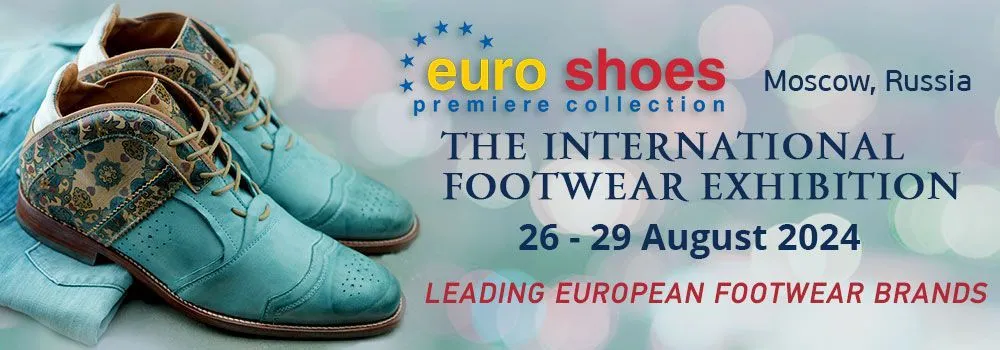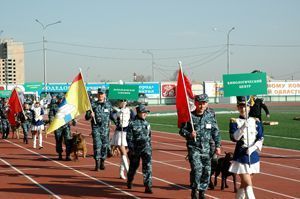
Russian Customs in 2008: Facts and Figures

Last year, the FCS of Russia set a record for collecting customs payments. Revenues from customs authorities have reached half of the federal budget revenues. These are the data of the official report of the FCS of Russia for 2008. The 2008 benchmark (4 trillion 611,7 billion rubles) was surpassed on December 22. What else rejoiced and what were the customs officers puzzled over last year?
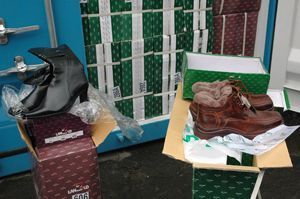 Security and protection of the economic interests of the Russian Federation
Security and protection of the economic interests of the Russian Federation
In just 11 months, the customs authorities initiated 4738 criminal cases (in 2007 - 4268). The most common objects of violations of customs legislation were land vehicles, consumer goods (clothing and footwear), narcotic drugs, psychotropic and potent substances, foreign currency and Russian currency, timber and timber, cultural values, food, seafood. The total value of goods and vehicles that have become targets of crimes exceeded RUB 13 billion. Also, over 11 months, the customs authorities initiated 75889 cases of administrative offenses (in 2007 - 74), for which 240 sentences were imposed in the amount of almost 6463 billion rubles.
New concept of customs clearance and customs control
At the end of August 2008, at a meeting of the collegium of the FCS of Russia, the draft Concept of customs clearance and customs control of goods in places close to the state border of the Russian Federation (concept) was approved, which is an integral part of the Strategy of the Federal Customs Service until 2020.
The concept is aimed at expanding the use of information technology, which should reduce the time required to complete all customs formalities, reduce the influence of the human factor and significantly facilitate the conduct of foreign economic activity.
The concept will be tested in St. Petersburg, the Moscow and Far Eastern regions on goods transported by air and sea. By mid-2009, customs clearance is planned to be removed from Moscow and St. Petersburg to the Moscow and Leningrad regions. The issues of creating a transport and logistics infrastructure for transferring customs clearance to the border regions of the Russian Federation are also being addressed.
Optimization of the structure of customs authorities
Throughout 2008, the FCS systematically reduced excess managerial links. As a result, 9 were created and eliminated 31 customs posts. This work will continue this year - in February, customs located in the Siberian Federal District will be reorganized (Naushkinskaya Customs will join Buryatskaya and Tolmachevskaya will join Novosibirsk), in March customs located in Moscow and the Moscow Region will be reorganized (Moscow Eastern Customs will be annexed to Schelkovo, Moscow South to Noginsk, Moscow West to Podolsk Customs).
Ensuring the transparency of the customs authorities
As part of the administrative reform, in 2008, the FCS of Russia adopted four administrative regulations in order to increase the efficiency of public administration in the customs sphere. These are the regulations for the provision of public services for the adoption of preliminary decisions on the classification of goods in accordance with the commodity nomenclature of foreign economic activity; on the provision of public services for the adoption of preliminary decisions on the country of origin of goods; on the performance of the state function of acceptance by the customs authority of the passenger customs declaration filed by an individual; to fulfill the state function of issuing qualification certificates to customs clearance specialists.
Improving customs clearance and customs control
At the customs border of the Russian Federation, there are 5 stationary and 42 mobile inspection and inspection complexes (IDC) in all regions of the country. For 11 months of 2008, more than 208 thousand consignments of goods were inspected using the IDK. During the customs control, 55 criminal cases and 1563 cases of administrative offenses were instituted.
On January 1, 2009, a project of automated information exchange between the customs services of the EU countries and the Russian customs service on goods transported under the TIR procedure was launched. The project will cover about 70% of all road freight from the EU to the Russian Federation.
Customs will improve pre-notification and electronic declaration technologies, including using the Internet. At some checkpoints, up to 30% of cargo is already cleared based on prior information. This really shortens the paperwork.
On July 1, 2008, at the Burachki checkpoint, in an experimental mode, a technological scheme for passing the state border on the principle of "one window" began to operate. The new technology eliminates duplication of functions and actions of control bodies, thereby increasing the throughput of the checkpoint. The experiment was recognized as a success, and at the end of November, new border control rules were approved by the Russian government.
Will hear
Customs officers noted that postaud becomes more effective. For 11 months, the customs inspection units conducted about 9 inspections. The total amount of additional customs duties and penalties exceeded 260 billion rubles. The effectiveness of inspections has more than doubled. On average, each brought 4 thousand rubles. receipts.
Also in 2008, the volume of currency control operations increased significantly. The volume of export operations with settlements in cash and other means of payment covered by currency control technologies for the 11 months of 2008 amounted to $ 457,8 billion and increased by 60% compared to the same period last year. The volume of import operations for 11 months of 2008 amounted to $ 221,3 billion, which is 47% more than the volume of import operations for the same period of 2007.
Counterfeiting
A new trend in 2008 was the entry into the Russian market of counterfeit goods with Olympic and para-Olympic symbols. To prevent and combat these offenses, the Federal Customs Service of Russia and the Sochi 2014 Organizing Committee concluded an Agreement on cooperation to implement a set of measures to protect Olympic symbols. In accordance with the agreement, trademarks associated with Olympic symbols are included in the customs register of intellectual property, if possible, for a maximum period (under the Labor Code of the Russian Federation - 5 years). In 2008, about 2 million units of counterfeit products with Olympic symbols were already detained.
Work with copyright holders and their associations has been intensified. In total, 1330 trademarks are registered in the Customs Register of Intellectual Property.
In 2008, the Russian customs service was recognized as the best among the customs authorities of 174 member states of the World Customs Organization following the results of the competition of national customs administrations to combat counterfeit products. The results were announced on June 27, 2008 in Brussels at the annual session of the WTO Council.
Fight against corruption
The fight against corruption has been, is and will remain in the spotlight of the FCS. In recent years, about 90% of all corruption-related criminal cases have been initiated based on the materials of the Federal Security Service of the Federal Customs Service of Russia. So, for 11 months of 2008, according to the materials of the service, 476 criminal cases were initiated.
Another area of work is the anti-corruption analysis of departmental regulatory acts adopted by customs authorities. In 2008, 30 draft regulatory legal acts were considered, of which 837 were rejected.
Between 2006 and 2008, several hundred senior officials of the customs authorities were rotated, including this year alone - more than 50 heads of customs and more than 150 heads of customs posts.
International customs cooperation
2008 was declared the Year of the Russian Federation in the Republic of India and the Year of the Republic of India in the Russian Federation. The Russian Customs Service paid special attention to strengthening and further developing cooperation with Indian colleagues. In December, during the official visit of Russian President Dmitry Medvedev to India, the heads of the customs services of Russia and India signed a Memorandum of Cooperation between the Russian Customs Academy and the National Academy of Excise, Customs and Drug Control.
A protocol on simplification of customs procedures was signed with the Customs Department of the Republic of Turkey. The pilot project developed in accordance with it is planned to be launched in early 2009. A special place in international customs cooperation is given to the CIS member states. In 2008, the FCS of Russia hosted the first meeting of the Committee of Heads of Law Enforcement Units of the Customs Services of the Member States of the Commonwealth of Independent States, chaired by Igor Zavrazhnov, deputy head of the FCS of Russia.
Within the framework of the EurAsEC, work continued on the formation of a single economic space, further improvement of integration processes, as well as the accelerated creation of the Customs Union of Russia, Belarus and Kazakhstan.
Ekaterinburg
The trademark of Nike, a sportswear and shoe manufacturer, is particularly popular with pirates. According to the press service of the Ural Customs Administration, in the past three years, almost 4000 items allegedly released under this brand have been arrested in Yekaterinburg. Adidas marked 3899 counterfeit products. Much less popular among the Chinese underground are Puma (464 products), Reebok (264) and Boss (132).
Birobidzhan
For the first time in January 2009, the Birobidzhan court passed a sentence for the illegal use of a trademark. The World Court found the 52-year-old sole proprietor guilty of illegal use of the Adidas trademark.
As Natalya Meshkova, senior assistant prosecutor of the EAO, explained, it was found that in the Natali shopping center, sports shoes were offered to customers with the famous Adidas shamrock applied to it. But the entrepreneur did not have a license agreement with the company. He put the shoes with a trusted trademark on the sale illegally.
During the investigation, it also became clear that the owner of the outlet was already held administratively liable for such an act, but he did not change the habit of earning on someone else's good name.
The court sentenced the defendant to a fine of 20 rubles. In addition, in favor of Vlasta-Consulting LLC, which suffered from the illegal use of a trademark, the amount of pecuniary damage was recovered from the convict - about 000 rubles.
Rostov-on-Don
Employees of the department for combating offenses in the field of the consumer market of air traffic control in Rostov-on-Don in December 2008 revealed the fact of the sale of a large batch of counterfeit shoes. On the territory of the Temernik clothing market, the distributor and concurrently the owner of the outlet sold men's shoes and boots without a quality certificate or even any information about the manufacturer.
During the event, policemen seized more than 5000 pairs of men's shoes of dubious quality and unknown origin. The owner of the outlet was brought to administrative responsibility under Art. 14.4 of the RF Code of Administrative Offenses (CRF on AP) "Sale of goods of inadequate quality" and according to Art. 14.15 KRF about AP "Violation of the rules for the sale of certain types of goods", the press service of the Ministry of Internal Affairs of Russia. These articles of the administrative code entail the imposition of an administrative fine from 100 to 300 times the minimum wage with or without confiscation of products.
| Please rate the article |
Materials on the topic
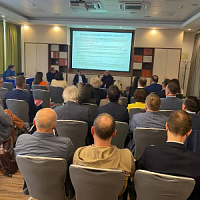
Results of the round table of shoemakers with the Ministry of Industry and Trade of the Russian Federation, CRPT, NOBS and Wildberries

World Footwear Yearbook: Global footwear production reaches 23,9 billion pairs and is back to pre-pandemic levels
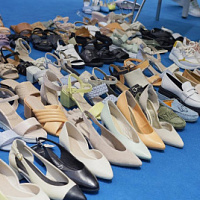
How to double the sales of a shoe store?
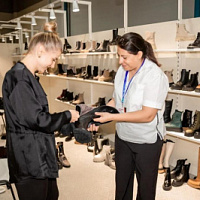
New direction of exhibitions in Alma-Ata: Euro Shoes @ Elite Line & CAF
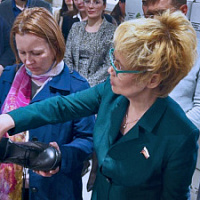
Round table with representatives of shoe factories of Dagestan with the support of the Ministry of Industry and Trade and NOBS
Popular
 We are ready for active development in the Russian market
Friedrich Naumann, CEO of the Tamaris brand, told Shoes Report about the company’s ambitious plans, business development in Russia and expansion of the retail network, and also shared details about new collections and launches.
We are ready for active development in the Russian market
Friedrich Naumann, CEO of the Tamaris brand, told Shoes Report about the company’s ambitious plans, business development in Russia and expansion of the retail network, and also shared details about new collections and launches.
 Coach turned to Big Data analysis and won the interest of a young audience
American handbag brand Coach has planned the success of its Tabby model among a younger audience, Generation Z, by turning to big data analysis, abandoning traditional and analogue tools, such as human intuition or the ability of any executive to sense “which way the wind will blow,” writes B.O.F.
Coach turned to Big Data analysis and won the interest of a young audience
American handbag brand Coach has planned the success of its Tabby model among a younger audience, Generation Z, by turning to big data analysis, abandoning traditional and analogue tools, such as human intuition or the ability of any executive to sense “which way the wind will blow,” writes B.O.F.
 IDOL updates the concept
The IDOL brand, part of the Melon Fashion Group portfolio, opened the first flagship in an updated concept in the Aviapark shopping center in Moscow.
IDOL updates the concept
The IDOL brand, part of the Melon Fashion Group portfolio, opened the first flagship in an updated concept in the Aviapark shopping center in Moscow.
 Louis Vuitton opens a new factory in Italy
Louis Vuitton has opened its second shoe factory in Italy. After opening the first one in Fiesso d'Artico in Veneto, the LVMH flagship brand has just opened a new production site dedicated to this category of footwear in the industrial zone of Civitano in the Marche region. There is also another brand production facility in Tuscany, where bags and leather accessories are produced, writes fr.fashionnetwork.com.
Louis Vuitton opens a new factory in Italy
Louis Vuitton has opened its second shoe factory in Italy. After opening the first one in Fiesso d'Artico in Veneto, the LVMH flagship brand has just opened a new production site dedicated to this category of footwear in the industrial zone of Civitano in the Marche region. There is also another brand production facility in Tuscany, where bags and leather accessories are produced, writes fr.fashionnetwork.com.
 The Euro Shoes@CAF exhibition will be held in Almaty
From March 11 to 13, the Euro Shoes@CAF (Central Asia Fashion) exhibition will be held in Almaty at the Atakent exhibition complex. The exhibition, which is the largest international event in the fashion industry in Central Asia, will present collections of clothing, shoes and accessories.
The Euro Shoes@CAF exhibition will be held in Almaty
From March 11 to 13, the Euro Shoes@CAF (Central Asia Fashion) exhibition will be held in Almaty at the Atakent exhibition complex. The exhibition, which is the largest international event in the fashion industry in Central Asia, will present collections of clothing, shoes and accessories.
 VAGA SHOES is a new participant in the Euro Shoes premiere collection
The Russian women's shoe factory VAGA SHOES will take part for the first time in the international exhibition of footwear and accessories Euro Shoes premiere collection in Moscow.
VAGA SHOES is a new participant in the Euro Shoes premiere collection
The Russian women's shoe factory VAGA SHOES will take part for the first time in the international exhibition of footwear and accessories Euro Shoes premiere collection in Moscow.
 Euro Shoes will start operating on February 19 in Moscow!
The winter session of the international exhibition of footwear and accessories Euro Shoes premiere collection will be held in Moscow at the Expocenter from February 19 to 22. The organizers promise the presence of all the main participants at the exhibition, as well as new names from Europe, Asia and Russia.
Euro Shoes will start operating on February 19 in Moscow!
The winter session of the international exhibition of footwear and accessories Euro Shoes premiere collection will be held in Moscow at the Expocenter from February 19 to 22. The organizers promise the presence of all the main participants at the exhibition, as well as new names from Europe, Asia and Russia.
 American buyers couldn't buy Birkin bags and sued Hermès
French fashion house Hermès is facing a lawsuit in California from two customers who were unable to purchase exclusive Birkin bags. The fashion house is accused of unfair commercial practices.
American buyers couldn't buy Birkin bags and sued Hermès
French fashion house Hermès is facing a lawsuit in California from two customers who were unable to purchase exclusive Birkin bags. The fashion house is accused of unfair commercial practices.
 John Galliano and Christian Louboutin created the Tabi collection for Maison Margiela
Maison Margiela creative director John Galliano and French shoe designer Christian Louboutin released a shoe collaboration that was included in the Maison Margiela Artisanal spring 2024 couture collection. The design duo created six versions of the Tabi shoe. All shoe models in the collection have a split toe - a characteristic touch of the signature Tabi shoe model of the Maison Margiela brand. And Christian Louboutin gave the shoe its signature red sole.
John Galliano and Christian Louboutin created the Tabi collection for Maison Margiela
Maison Margiela creative director John Galliano and French shoe designer Christian Louboutin released a shoe collaboration that was included in the Maison Margiela Artisanal spring 2024 couture collection. The design duo created six versions of the Tabi shoe. All shoe models in the collection have a split toe - a characteristic touch of the signature Tabi shoe model of the Maison Margiela brand. And Christian Louboutin gave the shoe its signature red sole.
 Why Rendez-Vous and Yandex Lavka released a “bread bag”
Shoe retailer Rendez-Vous announced the launch of a spring collaboration with Yandex Lavka and released a roll that resembles the shape of a woman’s handbag. This “Bread Bag” is presented in the Yandex.Lavka application at a price of 249 rubles. On the product packaging there is a promotional code for 1000 rubles, which can be spent in the Rendez-Vous network.
Why Rendez-Vous and Yandex Lavka released a “bread bag”
Shoe retailer Rendez-Vous announced the launch of a spring collaboration with Yandex Lavka and released a roll that resembles the shape of a woman’s handbag. This “Bread Bag” is presented in the Yandex.Lavka application at a price of 249 rubles. On the product packaging there is a promotional code for 1000 rubles, which can be spent in the Rendez-Vous network.
 Camper has released innovative sneakers - designers
Spanish brand Camper's new Roku sneaker features six interchangeable components to create up to 64 different looks and color combinations. Roku means "six" in Japanese.
Camper has released innovative sneakers - designers
Spanish brand Camper's new Roku sneaker features six interchangeable components to create up to 64 different looks and color combinations. Roku means "six" in Japanese.
 Christian Louboutin presented a collection in a cowboy style
At the Loubi Show in Paris, the French luxury brand Christian Louboutin presented its fall 2024 collection, following the trend - in the style of the Wild West. It included cowboy boots and rhinestone loafers.
Christian Louboutin presented a collection in a cowboy style
At the Loubi Show in Paris, the French luxury brand Christian Louboutin presented its fall 2024 collection, following the trend - in the style of the Wild West. It included cowboy boots and rhinestone loafers.
 Fashion Week takes place in Moscow
Fashion Week takes place in the Russian capital. Events include fashion shows, markets where you can purchase clothes, bags and accessories, and a B2B Showroom for fashion industry professionals.
Fashion Week takes place in Moscow
Fashion Week takes place in the Russian capital. Events include fashion shows, markets where you can purchase clothes, bags and accessories, and a B2B Showroom for fashion industry professionals.
 Fashion trends Fall-Winter 2023/24 for commercial footwear purchases
Permanent contributor to Shoes Report. Elena Vinogradova, an expert in sales and purchases in the fashion business, prepared an overview of the trends for the autumn-winter 2023/24 season especially for us.
Fashion trends Fall-Winter 2023/24 for commercial footwear purchases
Permanent contributor to Shoes Report. Elena Vinogradova, an expert in sales and purchases in the fashion business, prepared an overview of the trends for the autumn-winter 2023/24 season especially for us.
 MSCHF and Crocs launch "Big Yellow Boots"
Creator of the Big Red Boots, Brooklyn brand MSCHF has teamed up with American plastic clog and sandal brand Crocs for another oversized shoe. The new Big Yellow Boots will go on sale on August 9th.
MSCHF and Crocs launch "Big Yellow Boots"
Creator of the Big Red Boots, Brooklyn brand MSCHF has teamed up with American plastic clog and sandal brand Crocs for another oversized shoe. The new Big Yellow Boots will go on sale on August 9th.
 Five rules of professional lighting for a shoe store - something that is relevant in any season
When developing a lighting concept for shoe retailers, it is important to take into account not only the history of the brand, the architectural content of the premises, the target audience of the stores, but also the seasonality of the goods. With the onset of the cold season, client preferences change: bright weightless shoes are replaced by more massive models in discreet dark colors. Despite significant differences in summer and winter collections, the overall philosophy of the brand, its recognition should remain unchanged at any time of the year. Tatyana Ryzhova, an SR lighting expert in fashion retail, has identified five basic rules for a competent lighting concept for a shoe store for readers of the magazine, which will help to present winter assortment to customers in a winning way.
Five rules of professional lighting for a shoe store - something that is relevant in any season
When developing a lighting concept for shoe retailers, it is important to take into account not only the history of the brand, the architectural content of the premises, the target audience of the stores, but also the seasonality of the goods. With the onset of the cold season, client preferences change: bright weightless shoes are replaced by more massive models in discreet dark colors. Despite significant differences in summer and winter collections, the overall philosophy of the brand, its recognition should remain unchanged at any time of the year. Tatyana Ryzhova, an SR lighting expert in fashion retail, has identified five basic rules for a competent lighting concept for a shoe store for readers of the magazine, which will help to present winter assortment to customers in a winning way.
 Bertsy: what to look for when choosing a model
Bertsy and tactical boots are becoming more and more relevant footwear, and not only because of the start of the hunting season. In Russia, there are several dozen enterprises producing this type of footwear. Oleg Tereshin, Deputy Chief Technologist of ZENDEN, told Shoes Report about the differences and features of ankle boots and what you should pay attention to when buying them in specialized retail and online.
Bertsy: what to look for when choosing a model
Bertsy and tactical boots are becoming more and more relevant footwear, and not only because of the start of the hunting season. In Russia, there are several dozen enterprises producing this type of footwear. Oleg Tereshin, Deputy Chief Technologist of ZENDEN, told Shoes Report about the differences and features of ankle boots and what you should pay attention to when buying them in specialized retail and online.
 I doubt and object: how to find an approach to difficult clients?
How good and serene would be the work of a salesperson if the customers were calm, cheerful, always knew exactly what they wanted, and bought, bought, bought! It is a pity that this is possible only in dreams. Therefore, we will not dream, but we will act. Together with Maria Gerasimenko, a permanent author of SR, we understand the doubts and objections of buyers and build a strategy for working with them. Our expert pays special attention to the two main objections of buyers, on which 82% of sales are lost.
I doubt and object: how to find an approach to difficult clients?
How good and serene would be the work of a salesperson if the customers were calm, cheerful, always knew exactly what they wanted, and bought, bought, bought! It is a pity that this is possible only in dreams. Therefore, we will not dream, but we will act. Together with Maria Gerasimenko, a permanent author of SR, we understand the doubts and objections of buyers and build a strategy for working with them. Our expert pays special attention to the two main objections of buyers, on which 82% of sales are lost.
 EURO SHOES presents an updated section of the GLOBAL SHOES exhibition with collections of shoe and bag brands from Asian countries
EURO SHOES premiere collection is expanding. Along with the traditional pool of leading European footwear brands from Germany, Spain, Italy and Turkey, several dozen footwear and bag brands from the Middle Kingdom will be presented in the GLOBAL SHOES section at the Moscow Expocentre from August 29 to September 1.
EURO SHOES presents an updated section of the GLOBAL SHOES exhibition with collections of shoe and bag brands from Asian countries
EURO SHOES premiere collection is expanding. Along with the traditional pool of leading European footwear brands from Germany, Spain, Italy and Turkey, several dozen footwear and bag brands from the Middle Kingdom will be presented in the GLOBAL SHOES section at the Moscow Expocentre from August 29 to September 1.
 Two prominent Russian fashion designers Vyacheslav Zaitsev and Valentin Yudashkin passed away
One after another, two days apart, Vyacheslav Zaitsev and Valentin Yudashkin, outstanding fashion designers, whose work for the whole world was a kind of hallmark of fashionable Russia, left this world.
Two prominent Russian fashion designers Vyacheslav Zaitsev and Valentin Yudashkin passed away
One after another, two days apart, Vyacheslav Zaitsev and Valentin Yudashkin, outstanding fashion designers, whose work for the whole world was a kind of hallmark of fashionable Russia, left this world.
 World Footwear Yearbook: Global footwear production reaches 23,9 billion pairs and is back to pre-pandemic levels
The Portuguese association of shoe manufacturers APICCAPS published the 13th edition of the international statistical bulletin World Footwear Yearbook for 2023, according to which in 2022 the production and export of shoes worldwide increased by 7,6% and 9%, respectively, and the world production of shoes reached 23,9 billion couples and returned to pre-pandemic levels.
World Footwear Yearbook: Global footwear production reaches 23,9 billion pairs and is back to pre-pandemic levels
The Portuguese association of shoe manufacturers APICCAPS published the 13th edition of the international statistical bulletin World Footwear Yearbook for 2023, according to which in 2022 the production and export of shoes worldwide increased by 7,6% and 9%, respectively, and the world production of shoes reached 23,9 billion couples and returned to pre-pandemic levels.
 Rostov footwear brand Novak presented a collection of sneakers and sneakers
In the spring-summer 2023 season, the Rostov-on-Don shoe brand Novak presented a cute collection of sneakers and sneakers for every day. The upper of the shoe is made of genuine leather, suede, nubuck, the sole is made of light EVA.
Rostov footwear brand Novak presented a collection of sneakers and sneakers
In the spring-summer 2023 season, the Rostov-on-Don shoe brand Novak presented a cute collection of sneakers and sneakers for every day. The upper of the shoe is made of genuine leather, suede, nubuck, the sole is made of light EVA.
 How to create selling visual content for online based on the identified unique selling proposition?
What is a USP (unique selling proposition) and what is it for? Why is the USP creation service in great demand among fashion retailers today? How to create a working USP? Answers questions and provides step-by-step guidance on how to define your unique selling proposition and work with it to increase online sales, Tatyana Vasilyeva, an SR expert in the promotion and development of fashion brands.
How to create selling visual content for online based on the identified unique selling proposition?
What is a USP (unique selling proposition) and what is it for? Why is the USP creation service in great demand among fashion retailers today? How to create a working USP? Answers questions and provides step-by-step guidance on how to define your unique selling proposition and work with it to increase online sales, Tatyana Vasilyeva, an SR expert in the promotion and development of fashion brands.
 Shoe educational program: what shoe soles are made of
“What is the difference between TEP and EVA? What does tunit promise me? Is PVC glue? What is the sole of these shoes made of? ”- the modern buyer wants to know everything. In order not to smash his face in front of him and be able to explain whether such a sole suits him in soles, carefully read this article. In it, process engineer Igor Okorokov tells what materials the soles of shoes are made of and what makes each of them so good.
Shoe educational program: what shoe soles are made of
“What is the difference between TEP and EVA? What does tunit promise me? Is PVC glue? What is the sole of these shoes made of? ”- the modern buyer wants to know everything. In order not to smash his face in front of him and be able to explain whether such a sole suits him in soles, carefully read this article. In it, process engineer Igor Okorokov tells what materials the soles of shoes are made of and what makes each of them so good.
 How to set prices that will earn
Some businessmen still confuse the concept of margin with the concept of trade margins and set prices for their goods, guided solely by the example of competitors. No wonder they go broke! Analyst at the Academy of Retail Technologies Maxim Gorshkov gives several tips and formulas with which you can set not only ruinous, but also profitable prices.
How to set prices that will earn
Some businessmen still confuse the concept of margin with the concept of trade margins and set prices for their goods, guided solely by the example of competitors. No wonder they go broke! Analyst at the Academy of Retail Technologies Maxim Gorshkov gives several tips and formulas with which you can set not only ruinous, but also profitable prices.
 Sales of shoes and accessories: effective techniques for business rhetoric
Which speech modules are effective in communicating with potential and current customers of shoe stores, and which are not, Anna Bocharova, a business consultant, knows.
Sales of shoes and accessories: effective techniques for business rhetoric
Which speech modules are effective in communicating with potential and current customers of shoe stores, and which are not, Anna Bocharova, a business consultant, knows.
 We form the salary of sellers: expert advice
“How do you charge your consultants for personal or general sales?” Is one of the most popular questions causing a lot of controversy and gossip on the online forums of retail business owners. Indeed, how to properly form the earnings of sellers? But what about bonuses, where to get a sales plan from, do employees allow them to buy goods at discounted stores? In search of truth, the Shoes Report turned to a dozen shoe retailers, but no company wanted to disclose its motivation system - the process of its development was too complicated and individual. Then we asked four business consultants, and finally became convinced that the topic of seller motivation is very complex, because even our experts could not come to a common opinion.
We form the salary of sellers: expert advice
“How do you charge your consultants for personal or general sales?” Is one of the most popular questions causing a lot of controversy and gossip on the online forums of retail business owners. Indeed, how to properly form the earnings of sellers? But what about bonuses, where to get a sales plan from, do employees allow them to buy goods at discounted stores? In search of truth, the Shoes Report turned to a dozen shoe retailers, but no company wanted to disclose its motivation system - the process of its development was too complicated and individual. Then we asked four business consultants, and finally became convinced that the topic of seller motivation is very complex, because even our experts could not come to a common opinion.
 The whole truth about Bayer. Who is he and how to become one?
Bayer is no longer a new, but still a popular and sought-after profession. It’s fashionable to be a buyer. Buyers are at the origins of the emergence and development of trends. If the designer offers his vision of fashion in the season, then the buyer selects the most interesting commercial ideas. It is on buyers that the policy of sales of stores and what, in the end, the buyer will wear depends on. This profession is surrounded by a magical fleur, often associated with a lack of understanding of what exactly is the work of a buyer.
The whole truth about Bayer. Who is he and how to become one?
Bayer is no longer a new, but still a popular and sought-after profession. It’s fashionable to be a buyer. Buyers are at the origins of the emergence and development of trends. If the designer offers his vision of fashion in the season, then the buyer selects the most interesting commercial ideas. It is on buyers that the policy of sales of stores and what, in the end, the buyer will wear depends on. This profession is surrounded by a magical fleur, often associated with a lack of understanding of what exactly is the work of a buyer.
 Technology Selling Issues
There is nothing worse than meeting the buyer with the words “Hello, can I help you with something?”, Because the seller works in the store just to help. Criticizing this well-established pattern of communication with the buyer, Andrei Chirkarev, business coach for effective sales and the founder of the New Economy project, shares the technology of truly selling issues with readers of Shoes Report.
Technology Selling Issues
There is nothing worse than meeting the buyer with the words “Hello, can I help you with something?”, Because the seller works in the store just to help. Criticizing this well-established pattern of communication with the buyer, Andrei Chirkarev, business coach for effective sales and the founder of the New Economy project, shares the technology of truly selling issues with readers of Shoes Report.
 Fur, and not only: types of lining
In the production of winter footwear, various materials are used that are designed to retain heat and meet the requirements of consumers: natural sheepleather, artificial fur, artificial fur from natural wool and others. All types of lining fur have their own advantages and disadvantages. Let's consider the properties of each of them.
Fur, and not only: types of lining
In the production of winter footwear, various materials are used that are designed to retain heat and meet the requirements of consumers: natural sheepleather, artificial fur, artificial fur from natural wool and others. All types of lining fur have their own advantages and disadvantages. Let's consider the properties of each of them.
 Retail Arithmetic
Before you begin to solve specific problems, you need to find out how accurately all the leaders of your company understand the basic terminology of retail.
Retail Arithmetic
Before you begin to solve specific problems, you need to find out how accurately all the leaders of your company understand the basic terminology of retail.
 How to fire a worker without tears, scandal and trial
Sooner or later, any manager is faced with the need to part with an employee. Properly and on time the dismissal procedure will save the company money, and the boss himself - nerves and time. But why sometimes, knowing that a break in relations is inevitable, we put off the decision for months?
How to fire a worker without tears, scandal and trial
Sooner or later, any manager is faced with the need to part with an employee. Properly and on time the dismissal procedure will save the company money, and the boss himself - nerves and time. But why sometimes, knowing that a break in relations is inevitable, we put off the decision for months?


